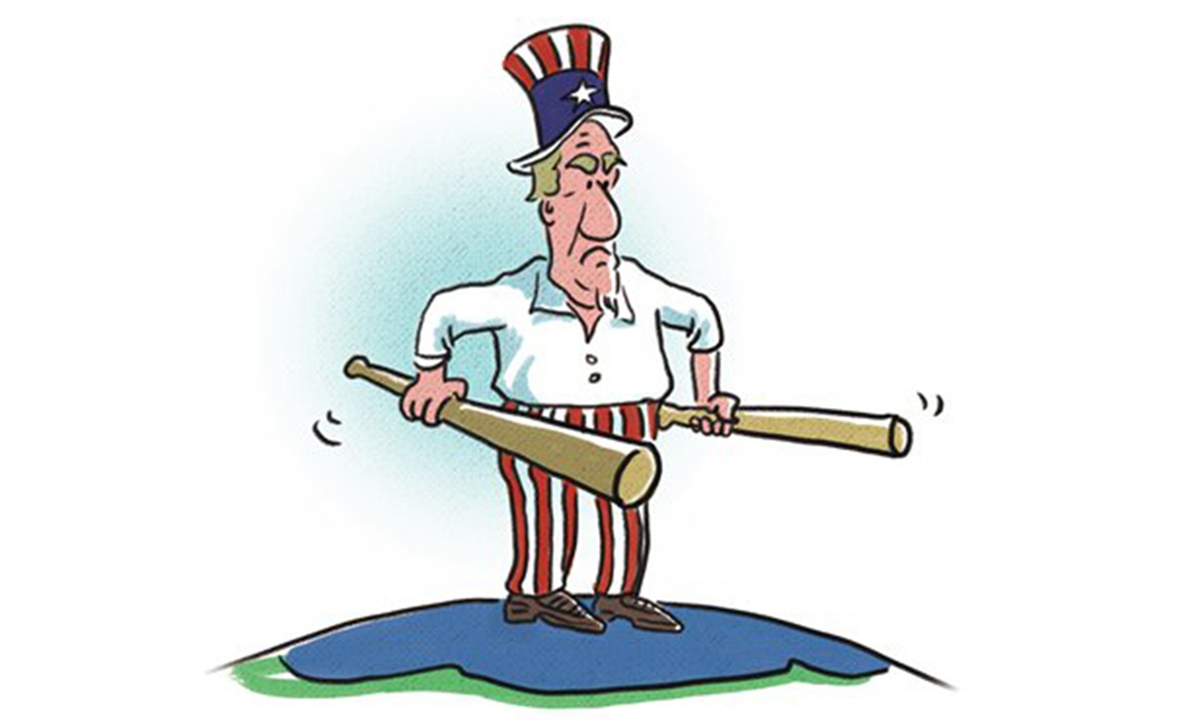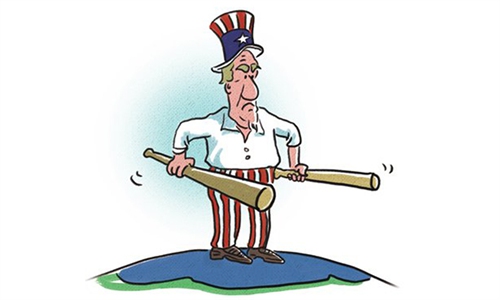
US hegemony Illustration: Liu Rui/GT
"We'll stand together with others against economic coercion and intimidation," said US Secretary of State Antony Blinken. It is interesting that he opposes coercion in a public address. He may think twice before enunciating the "C" word if he had revisited history. It was Alexander George, an American academic, that coined the concept of "coercive diplomacy" as a US alternative to war in the 1970s.Coercion by the US could come with brute force. In the 1960s, the US fermented a civil war in Laos to subvert the Communist government. In 1961, President Kennedy wrote that "Laos … is a most inhospitable area in which to wage a campaign. Its geography, topography, and climate are built-in liabilities." So the US sent bombers rather than troops. For nine years, the US dropped the equivalent of a planeload of bombs every eight minutes, 24 hours a day. Between 1964 and 1973, 580,000 bombing missions were carried out, showering more than two million tons of explosives on the sovereign country. Now, 49 years after the bombing campaign ended, its legacy continues to wreak havoc. Between 1975 and 2008, the 30 percent, or 80 million bombs, that did not explode upon impact have claimed approximately 50,000 Lao lives.
Today, unilateral sanctions are the preferred form of US coercion, this approach doesn't produce plumes of smoke but still hurts ordinary people. According to Sputnik News, the US imposed 5,532 sanctions on Russia from 2014 to March 2022, including 2,778 that were put in place after the Russia-Ukraine military conflict began. They have driven away over 600 private companies and are projected to squeeze Russia's GDP by somewhere between 15 percent and 30 percent. To choke off the Russian economy, the US has hobbled foreign companies trading with Russia. Since December 2019, the US has imposed sanctions on Nord Stream 2, a pipeline delivering Russian natural gas to Europe. Sanctions were slapped on German personnel and companies to force them to suspend the project. After fanning the flames in Ukraine, the US forced countries "to stand on the right side of history," meaning "to toe the US line," in condemning and sanctioning Russia. Otherwise, expect debilitating sanctions.
Besides unilateral sanctions, the US has also frequently threatened or employed "long-arm jurisdiction" to strangle its competitors. In September 2021, the US Department of Commerce announced that global semiconductor manufacturers like the ROK's Samsung had to submit internal information of their chip inventory as well as orders and sales data. In the name of increasing transparency and addressing global supply shortage, the US government gave the companies 45 days to answer the "voluntary request." In an interview with Reuters, Commerce Secretary Gina Raimondo said that "we have other tools in our tool box that require them to give us data. I hope we don't get there. But if we have to, we will."
These threatening remarks remind people of the US economic kneecapping of France's Alstom company. In 2013, the US Department of Justice detained several executives from Alstom as "economic hostages" to force the French company into a fire sale of its core business to its US rival General Electric. In his book The American Trap, Frederic Pierucci, a former senior manager at Alstom, revealed that he had been detained for five years and had to plead guilty to US charges. The investigation by the US Department of Justice ended in GE's $17 billion takeover of Alstom in 2014. It was "economic war," mused Mr. Pierucci. It took similar, coercive measures against Huawei's Meng Wanzhou only four years later, in an attempt to stall the development of the Chinese technology giant.
Coercion has become a go-to tool for US diplomacy. An op-ed in Newsweek once commented that "Washington has become addicted to sanctions like a five-year-old is addicted to candy." When Blinken said in his China policy speech recently that "many of our partners already know from painful experience how Beijing can come down hard when they make choices that it dislikes," he might well be thinking of Washington's coercive acts against other countries. That statement only makes sense by replacing "Beijing" with "Washington."
The author is a commentator on international affairs, writing regularly for Global Times, China Daily, etc. He can be reached at xinping604@gmail.com.


